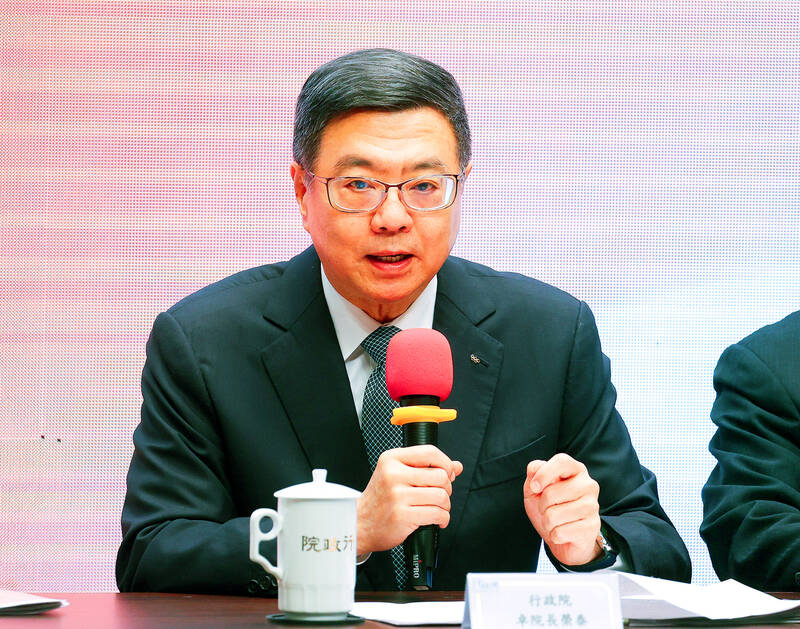The Economic Development Committee yesterday detailed its plans and drafted a proposal aiming to attract domestic and international investment into vital industries, which are valued at NT$3 trillion to NT$4 trillion (US$92 billion to US$123 billion).
Premier Cho Jung-tai (卓榮泰) chaired the first meeting of the committee and in the opening statements said that it has a mission, and the government is determined to embrace innovation, be more open and keep abreast of the times.
If approved, the proposal would require drafting new laws to ensure that the Grand Taiwan Investment policy is launched successfully, Cho said.

Photo: CNA
The committee also passed a proposal to establish an Asian asset management center with Taiwanese characteristics, Cho said.
The center would take advantage of the Financial Supervisory Commission’s expertise in analysis to better use Taiwanese slush funds, he said, adding that it would aim to create a better environment for the financial industry and “green banking.”
The committee also approved a proposal to teach 200,000 people artificial intelligence techniques and attract 120,000 foreigners with expertise, he said.
The committee would convene at least once a quarter, and meetings are expected in September and November, with a consultants’ meeting expected to be held next month, he said.
Separately, President William Lai (賴清德) met with the members of the World Taiwanese Chambers of Commerce (WTCC) and said the nation has passed policies to attract more Taiwanese businesspeople based overseas with an aim to build a better and more prosperous nation.
Lai thanked the WTCC and Taiwanese businesspeople overseas for promoting Taiwan and being the “bridge” between the nation and other countries.
He also thanked the WTCC for raising NT$10 million following the April 3 earthquake in Hualien.
His inaugural address laid out three principles regarding how Taiwan’s industries could develop — embracing the future and technology, expanding into space and the maritime sector, and resolving investment issues to encourage foreign investors — to ensure a better and more prosperous future for the nation, Lai said.
Meanwhile, the Executive Yuan yesterday approved a Ministry of Health and Welfare proposal to launch a four-year program, with an estimated cost of NT$13.5 billion to improve medical treatment for children.
The program would continue a 2020 program to improve children’s medical care, which would end this year.
The new program aims to implement continuous healthcare for newborns, beginning from the prenatal period, the ministry said.
It also aims to enact a tiered system for children’s emergency hospital care, it said.
Personnel training on the handling of newborns, and children’s cancer, severe and genetic-related cases would be prioritized, the ministry said.

The Taiwanese passport ranked 33rd in a global listing of passports by convenience this month, rising three places from last month’s ranking, but matching its position in January last year. The Henley Passport Index, an international ranking of passports by the number of designations its holder can travel to without a visa, showed that the Taiwan passport enables holders to travel to 139 countries and territories without a visa. Singapore’s passport was ranked the most powerful with visa-free access to 192 destinations out of 227, according to the index published on Tuesday by UK-based migration investment consultancy firm Henley and Partners. Japan’s and

NATIONAL SECURITY THREAT: An official said that Guan Guan’s comments had gone beyond the threshold of free speech, as she advocated for the destruction of the ROC China-born media influencer Guan Guan’s (關關) residency permit has been revoked for repeatedly posting pro-China content that threatens national security, the National Immigration Agency said yesterday. Guan Guan has said many controversial things in her videos posted to Douyin (抖音), including “the red flag will soon be painted all over Taiwan” and “Taiwan is an inseparable part of China,” while expressing hope for expedited “reunification.” The agency received multiple reports alleging that Guan Guan had advocated for armed reunification last year. After investigating, the agency last month issued a notice requiring her to appear and account for her actions. Guan Guan appeared as required,

Japan and the Philippines yesterday signed a defense pact that would allow the tax-free provision of ammunition, fuel, food and other necessities when their forces stage joint training to boost deterrence against China’s growing aggression in the region and to bolster their preparation for natural disasters. Japan has faced increasing political, trade and security tensions with China, which was angered by Japanese Prime Minister Sanae Takaichi’s remark that a Chinese attack on Taiwan would be a survival-threatening situation for Japan, triggering a military response. Japan and the Philippines have also had separate territorial conflicts with Beijing in the East and South China

A strong cold air mass is expected to arrive tonight, bringing a change in weather and a drop in temperature, the Central Weather Administration (CWA) said. The coldest time would be early on Thursday morning, with temperatures in some areas dipping as low as 8°C, it said. Daytime highs yesterday were 22°C to 24°C in northern and eastern Taiwan, and about 25°C to 28°C in the central and southern regions, it said. However, nighttime lows would dip to about 15°C to 16°C in central and northern Taiwan as well as the northeast, and 17°C to 19°C elsewhere, it said. Tropical Storm Nokaen, currently